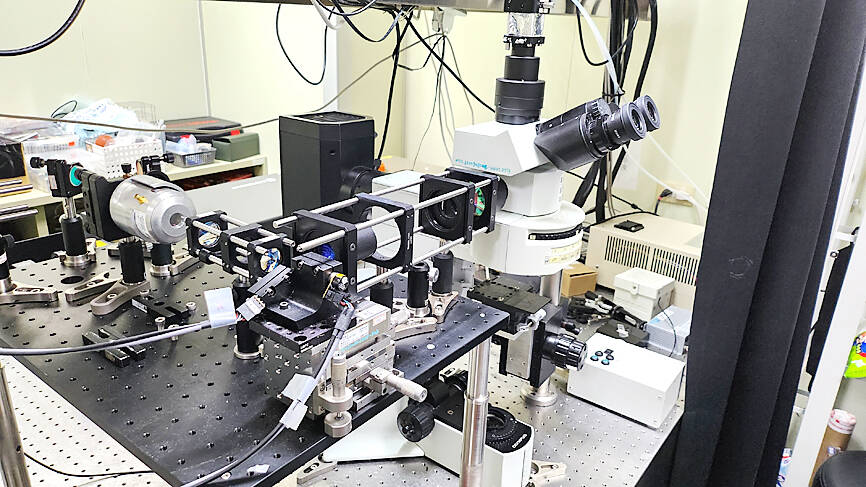Taiwanese scientists have developed the world’s first ultra-high-speed four-dimensional microscope in a breakthrough that enables the observation of electric activity in living neurons.
A multidisciplinary group of researchers from National Taiwan University (NTU) and National Tsing Hua University created the technology and published a study on it with a government grant, the team told a news conference at the National Science and Technology Council yesterday.
The device is thousands of times faster than traditional microscopes and uses artificial intelligence (AI) to increase the image resolution by 10 times, study coauthor and NTU physics professor Chu Shi-wei (朱士維) said.

Photo courtesy of the National Science and Technology Council
The technology represents a leap forward in speed, resolution and image range enabling neural signal transmission to be observed with great detail in real time, compared with existing electronic microscopes that can observe only nonliving specimens, he said.
Using the novel microscope, the team monitored the brain activity of mice to discover that neurons governing motor functions were distributed in parallel, he said.
The arrangement implied that neurons can function independently or be combined to create motor movement patterns, similar to graphics processing units in computers, he said.
That means transmitting a similar signal to different neural networks would lead to distinct results in the cellular body, Chu said.
The microscope’s unprecedented capability can potentially be applied to the observation of electric signals in the human brain to benefit researchers working in neurobiology and AI-related fields, he said.
The human brain’s remarkable energy efficiency would be of interest to chipmakers to reduce the power consumption in servers, he said.
NTU professor of pharmacology Pan Ming-kai (潘明楷) said the human brain uses as little as the equivalent of 12 watts of electricity compared with generative AI, which requires up to 2 megawatts.
The microscope could additionally be used in the study of epilepsy, tremors or dementia, he added.
The study was published last month in the journal Advanced Science.

The Central Election Commission has amended election and recall regulations to require elected office candidates to provide proof that they have no Chinese citizenship, a Cabinet report said. The commission on Oct. 29 last year revised the Measures for the Permission of Family-based Residence, Long-term Residence and Settlement of People from the Mainland Area in the Taiwan Area (大陸地區人民在台灣地區依親居留長期居留或定居許可辦法), the Executive Yuan said in a report it submitted to the legislature for review. The revision requires Chinese citizens applying for permanent residency to submit notarial documents showing that they have lost their Chinese household record and have renounced — or have never

A magnitude 5.6 earthquake struck off the coast of Yilan County at 12:37pm today, with clear shaking felt across much of northern Taiwan. There were no immediate reports of damage. The epicenter of the quake was 16.9km east-southeast of Yilan County Hall offshore at a depth of 66.8km, Central Weather Administration (CWA) data showed. The maximum intensity registered at a 4 in Yilan County’s Nanao Township (南澳) on Taiwan’s seven-tier scale. Other parts of Yilan, as well as certain areas of Hualien County, Taipei, New Taipei City, Taoyuan, Hsinchu County, Taichung and Miaoli County, recorded intensities of 3. Residents of Yilan County and Taipei received

Taiwan has secured another breakthrough in fruit exports, with jujubes, dragon fruit and lychees approved for shipment to the EU, the Ministry of Agriculture said yesterday. The Animal and Plant Health Inspection Agency on Thursday received formal notification of the approval from the EU, the ministry said, adding that the decision was expected to expand Taiwanese fruit producers’ access to high-end European markets. Taiwan exported 126 tonnes of lychees last year, valued at US$1.48 million, with Japan accounting for 102 tonnes. Other export destinations included New Zealand, Hong Kong, the US and Australia, ministry data showed. Jujube exports totaled 103 tonnes, valued at

BIG SPENDERS: Foreign investors bought the most Taiwan equities since 2005, signaling confidence that an AI boom would continue to benefit chipmakers Taiwan Semiconductor Manufacturing Co’s (TSMC, 台積電) market capitalization swelled to US$2 trillion for the first time following a 4.25 percent rally in its American depositary receipts (ADR) overnight, putting the world’s biggest contract chipmaker sixth on the list of the world’s biggest companies by market capitalization, just behind Amazon.com Inc. The site CompaniesMarketcap.com ranked TSMC ahead of Saudi Aramco and Meta Platforms Inc. The Taiwanese company’s ADRs on Tuesday surged to US$385.75 on the New York Stock Exchange, as strong demand for artificial intelligence (AI) applications led to chip supply constraints and boost revenue growth to record-breaking levels. Each TSMC ADR represents